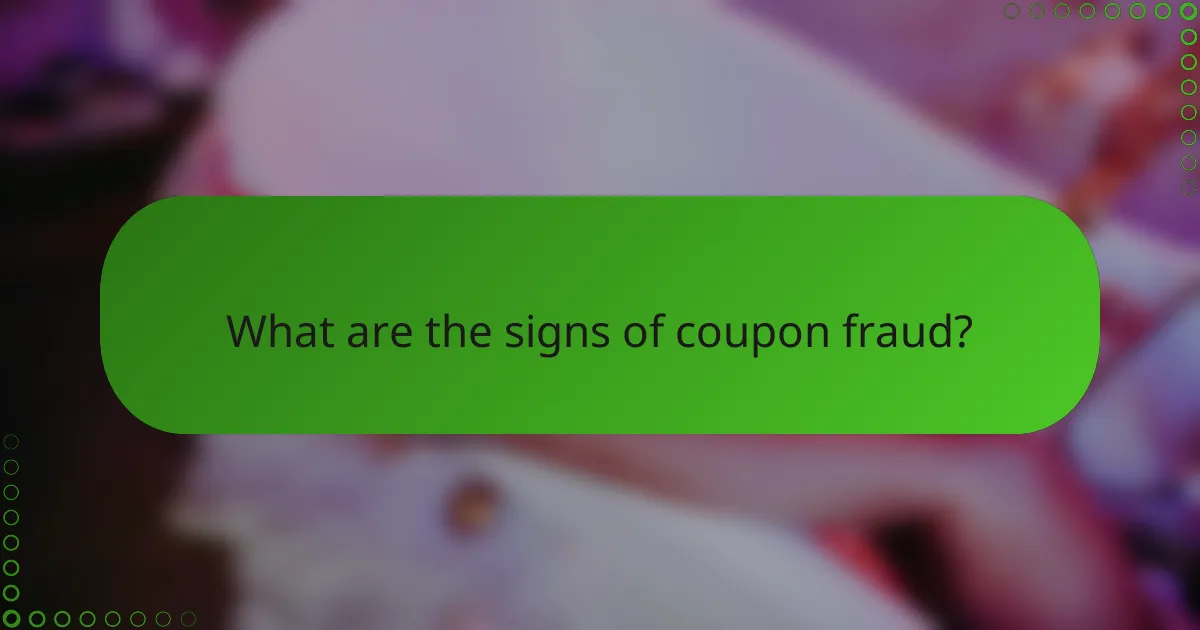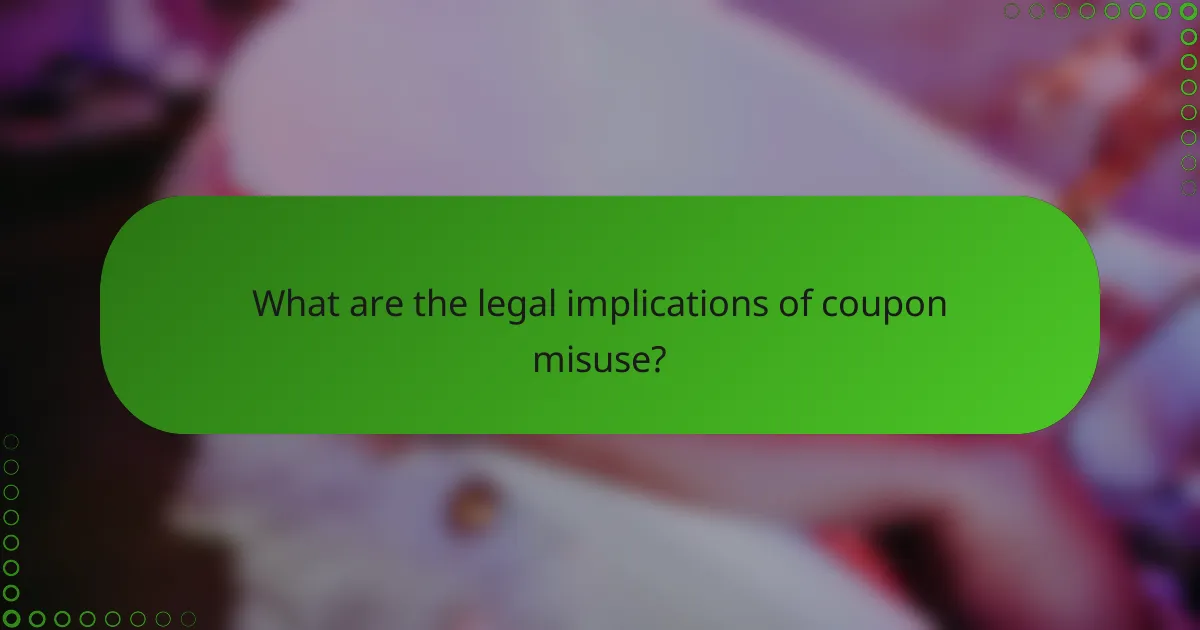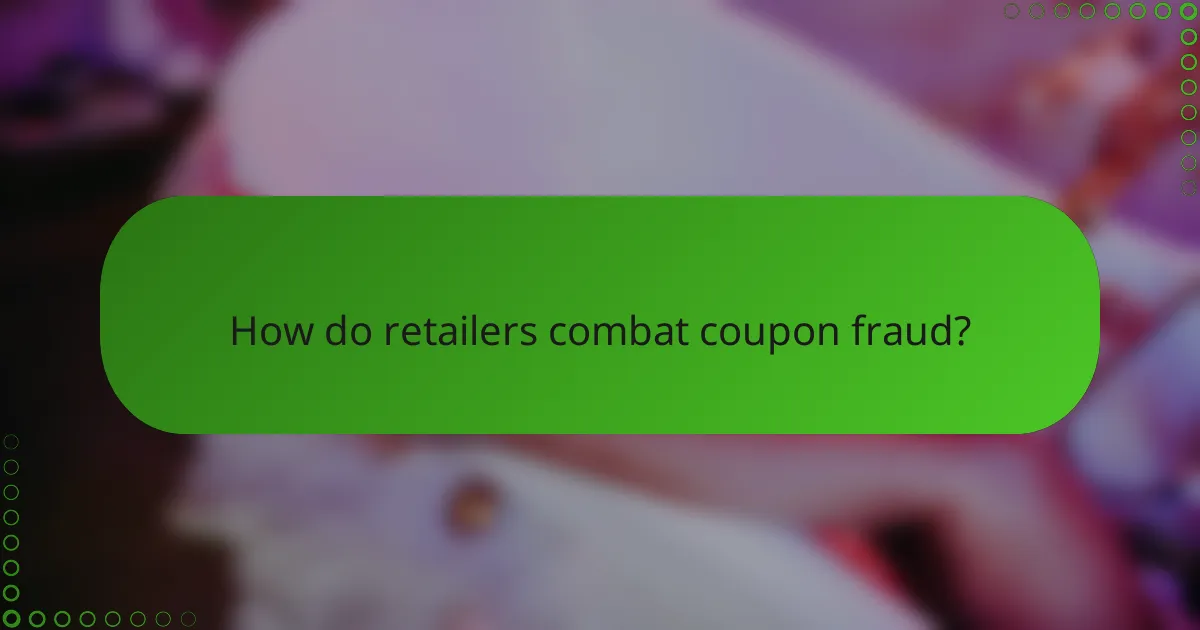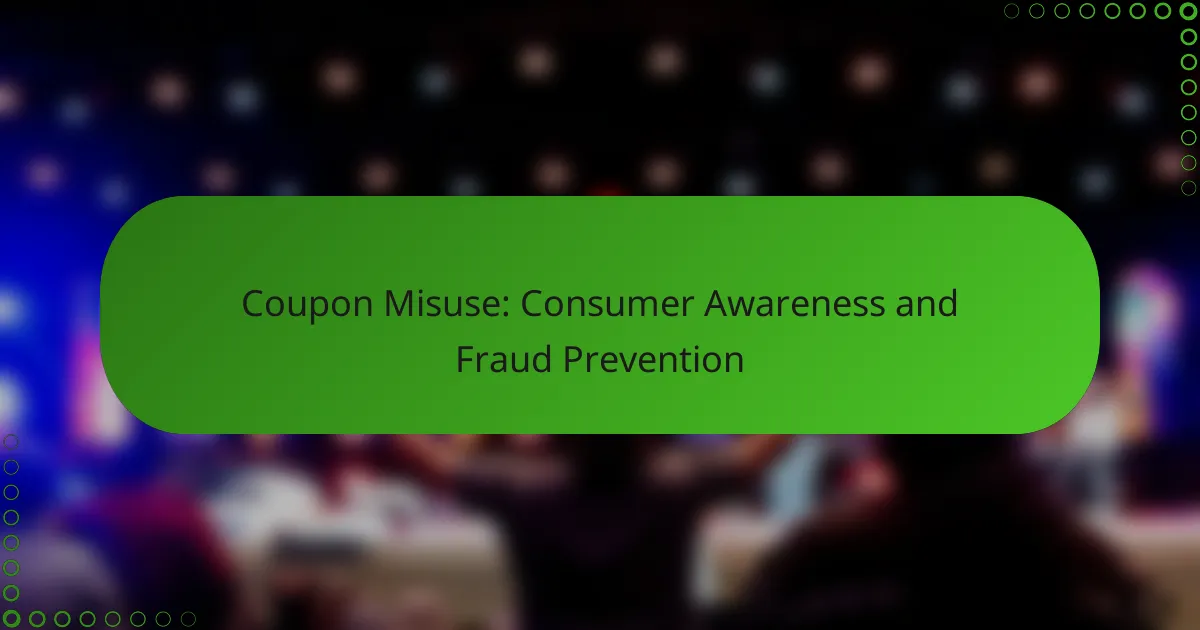Coupon misuse poses a significant risk to consumers, with common practices including unauthorized duplication, expired usage, and the use of fake coupons. By understanding these issues, consumers can better protect themselves and ensure they are utilizing coupons legitimately. Staying vigilant about coupon sources and recognizing signs of fraud are essential steps in safeguarding against scams while maximizing savings.

What are common types of coupon misuse?
Common types of coupon misuse include unauthorized duplication, expired coupon usage, misrepresentation of coupon terms, and the use of fake coupons. Understanding these practices can help consumers avoid pitfalls and ensure they are using coupons legitimately.
Unauthorized duplication
Unauthorized duplication occurs when individuals make copies of coupons without permission from the issuing company. This practice is illegal and can lead to penalties for both the user and the retailer accepting the duplicated coupons.
To avoid this issue, always use coupons directly from reputable sources, such as official websites or authorized retailers. Be cautious of coupons shared on social media or third-party sites, as they may not be valid.
Expired coupon usage
Using expired coupons is a common mistake that can lead to disappointment at checkout. Coupons typically have a specific validity period, and attempting to use them after this date is considered misuse.
Check the expiration date before using any coupon. If a coupon is close to expiring, plan your purchases accordingly to ensure you can redeem it in time.
Misrepresentation of coupon terms
Misrepresentation of coupon terms happens when consumers misunderstand or deliberately misstate the conditions attached to a coupon. This can include using a coupon for an item not covered by the offer or failing to meet minimum purchase requirements.
Always read the fine print on coupons to understand the terms fully. If you’re unsure about any conditions, ask the retailer for clarification before attempting to use the coupon.
Use of fake coupons
The use of fake coupons is a serious form of fraud that can result in legal consequences. These counterfeit coupons often look legitimate but are not recognized by retailers or manufacturers.
To protect yourself, only obtain coupons from trusted sources. If a deal seems too good to be true, it likely is. Report any suspected counterfeit coupons to the retailer or manufacturer to help prevent fraud.

How can consumers prevent coupon fraud?
Consumers can prevent coupon fraud by being vigilant about the sources of their coupons, understanding the terms associated with them, and reporting any suspicious activities. Awareness and proactive measures are key to avoiding scams and ensuring legitimate savings.
Verify coupon sources
Always check the origin of the coupons you receive. Legitimate coupons typically come from well-known retailers, official websites, or trusted promotional emails. Avoid coupons from unknown sources, as they may be counterfeit or fraudulent.
To verify a coupon’s authenticity, look for signs such as a clear expiration date, a unique barcode, and proper branding. If a coupon seems too good to be true, it likely is.
Understand coupon terms and conditions
Each coupon has specific terms and conditions that dictate how and when it can be used. Familiarize yourself with these details to avoid issues at checkout. Common terms include expiration dates, minimum purchase requirements, and restrictions on certain products.
For example, a coupon may state it is valid only for certain brands or sizes. Reading the fine print can save you from disappointment and ensure you use the coupon correctly.
Report suspicious activities
If you encounter a coupon that seems fraudulent or notice suspicious behavior, report it to the retailer or the relevant authorities. Most companies have dedicated channels for reporting fraud, which helps protect other consumers.
Additionally, you can report scams to consumer protection agencies or online platforms that track fraudulent activities. Taking action not only helps you but also contributes to a safer shopping environment for everyone.

What are the signs of coupon fraud?
Signs of coupon fraud can include unusual transaction patterns, inconsistent coupon redemption, and excessive coupon usage. Recognizing these indicators can help consumers avoid falling victim to fraudulent activities and ensure they are using coupons legitimately.
Unusual transaction patterns
Unusual transaction patterns often indicate potential coupon fraud. For example, if a consumer frequently purchases high quantities of items that are usually bought in smaller amounts, it may raise red flags. Retailers should monitor for sudden spikes in coupon use, particularly for high-value coupons, as this can suggest misuse.
Additionally, transactions that occur during off-peak hours or in bulk can be suspicious. Consumers should be aware of their shopping habits and report any discrepancies to retailers to help combat fraud.
Inconsistent coupon redemption
Inconsistent coupon redemption refers to the irregular use of coupons that do not align with typical consumer behavior. For instance, if a customer consistently redeems coupons for products they rarely purchase, it may indicate fraudulent activity. Retailers should track redemption patterns to identify these inconsistencies.
Consumers should also keep an eye on their own coupon usage. If a coupon is redeemed without a corresponding purchase or if the same coupon is used multiple times in a short period, it could signal misuse. Reporting such instances can help maintain the integrity of coupon programs.
Excessive coupon usage
Excessive coupon usage is a clear sign of potential fraud. If a single individual or account is using a large number of coupons in a short timeframe, it may suggest that the coupons are being misused or obtained through illegitimate means. Retailers should set limits on the number of coupons that can be redeemed per transaction or per customer to mitigate this risk.
Consumers should be cautious about using multiple coupons for the same product or attempting to stack discounts beyond what is allowed. Understanding the terms and conditions of coupon usage can help prevent unintentional fraud and ensure compliance with retailer policies.

What are the legal implications of coupon misuse?
Coupon misuse can lead to serious legal consequences, including criminal charges and civil penalties. Misusing coupons typically involves fraudulent activities that violate consumer protection laws and can result in significant fines or even imprisonment.
Fraud charges
Fraud charges related to coupon misuse can arise when individuals or businesses intentionally deceive others to gain financial benefits. This may include using counterfeit coupons, altering legitimate ones, or using expired coupons. Penalties for fraud can vary widely, often resulting in hefty fines or jail time depending on the severity of the offense.
For example, a retailer caught accepting fraudulent coupons may face charges that could lead to thousands of dollars in fines. Consumers should be aware that even unintentional misuse can lead to legal repercussions if it is deemed fraudulent by authorities.
Consumer protection laws
Consumer protection laws are designed to safeguard buyers from deceptive practices, including coupon misuse. In many countries, these laws prohibit false advertising and require businesses to honor the terms of their promotions. Violating these laws can result in legal action from both consumers and regulatory bodies.
In the United States, the Federal Trade Commission (FTC) enforces regulations related to coupon promotions, ensuring that businesses provide accurate information about their offers. Consumers should familiarize themselves with these laws to understand their rights and avoid inadvertently participating in fraudulent activities.

How do retailers combat coupon fraud?
Retailers combat coupon fraud through a combination of advanced technology, employee training, and partnerships with law enforcement. These strategies help to minimize losses and protect both consumers and businesses from fraudulent activities.
Advanced tracking systems
Advanced tracking systems enable retailers to monitor coupon usage in real-time, identifying patterns that may indicate fraudulent behavior. These systems often utilize unique codes or barcodes that can be scanned at the point of sale, allowing for precise tracking of each coupon’s redemption.
By analyzing data from these tracking systems, retailers can spot unusual spikes in coupon use or identify specific locations where fraud is more prevalent. This information can inform targeted interventions to reduce misuse.
Employee training programs
Employee training programs are essential for equipping staff with the knowledge to recognize and prevent coupon fraud. Retailers often conduct regular training sessions that cover the types of fraud to watch for, as well as the proper procedures for verifying coupon authenticity.
Training can include practical exercises, such as role-playing scenarios, to help employees feel confident in their ability to handle suspicious transactions. Clear guidelines and resources should be provided to ensure that employees know how to report potential fraud effectively.
Collaboration with law enforcement
Collaboration with law enforcement agencies enhances retailers’ ability to combat coupon fraud. By sharing information about fraudulent activities and trends, retailers can help law enforcement identify and apprehend offenders.
Retailers may also participate in local task forces or initiatives aimed at reducing retail crime, which can include coupon fraud. This partnership not only strengthens the retailer’s defenses but also fosters a community-wide approach to fraud prevention.

What role do digital coupons play in fraud prevention?
Digital coupons are essential tools for fraud prevention, as they incorporate advanced security features that help verify authenticity and usage. By utilizing unique codes and tracking systems, retailers can significantly reduce the risk of coupon misuse and ensure that discounts are applied correctly.
Secure verification processes
Secure verification processes are crucial in confirming the legitimacy of digital coupons. Many retailers implement unique barcodes or QR codes that must be scanned at the point of sale, ensuring that each coupon is valid and has not been duplicated. This method minimizes the chances of fraudulent copies being redeemed.
Additionally, some systems require user authentication, such as linking coupons to specific accounts or requiring a login before accessing discounts. This adds another layer of security, making it harder for fraudsters to exploit coupon offers.
Real-time tracking capabilities
Real-time tracking capabilities allow retailers to monitor coupon usage as it happens, providing immediate insights into redemption patterns. This helps identify unusual activities, such as multiple redemptions from the same account or location, which may indicate fraudulent behavior. Retailers can then take swift action to investigate and prevent further misuse.
Moreover, these tracking systems can provide valuable data on customer behavior, helping retailers tailor their marketing strategies while maintaining security. For example, if a particular coupon is redeemed excessively, it may prompt a review of its terms or a temporary suspension of its availability to mitigate fraud risks.










